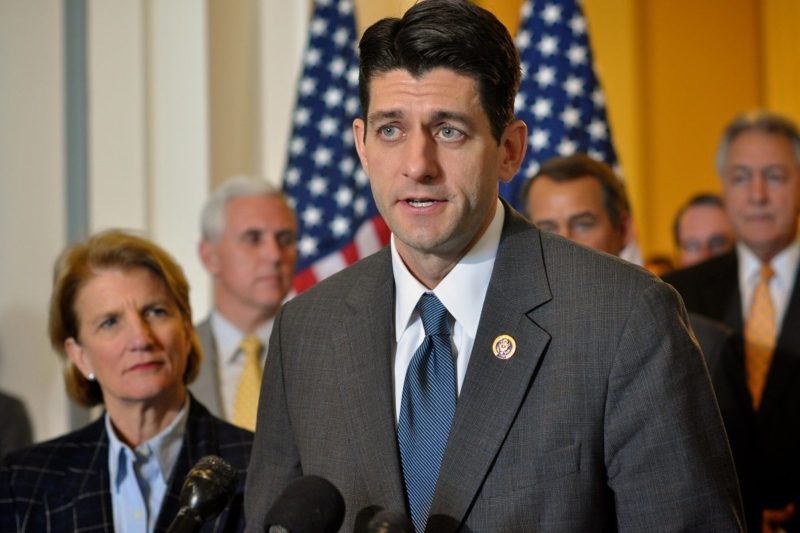Paul Ryan’s Health-Care Pitch Would Put ‘Greater Burden’ on Sick Americans
Rep. Paul Ryan’s plan to address those with pre-existing conditions may sound familiar to many following the election closely—and that’s because Carly Fiorina made an almost identical pitch in November during a Republican debate.

Rep. Paul Ryan (R-WI) told students at Georgetown University on Wednesday that the Affordable Care Act’s (ACA) protections for the sick should be replaced with high-risk pools, a conservative plan previously pitched by Carly Fiorina and one that advocates say would put “a greater burden” on sick Americans.
Speaking at a “millennial town hall” event, Ryan, who has spent the last several months attempting to rebrand himself as a more compassionate alternative to Trump, said that the ACA’s cost protections for sick individuals-a core component of Obamacare-should be replaced with state risk pools. “Less than 10 percent of the people under 65 are in what we call ‘people with pre-existing conditions,’ who are really kind of uninsurable,” said Ryan to a room of 500 students.
“Let’s fund risk pools at the state level to subsidize their coverage, so that they can get affordable coverage,” he continued. “You dramatically lower the price for everybody else. You make health insurance so much more affordable, so much more competitive, and open up the competition.”
The ACA’s provision protecting individuals with pre-existing conditions ensures, according to the Department of Health and Human Services, “health insurance companies can’t refuse to cover you or charge you more just because you have a ‘pre-existing condition’-that is, a health problem you had before the date that new health coverage starts.”
Though Ryan justified moving those with pre-existing conditions to high-risk pools by claiming that a relatively small percentage of those in the United States fall into this category, a 2012 analysis by the Government Accountability Office (GAO) found that, for adults under 65, “between 36 million and 122 million … reported medical conditions that could result in a health insurer restricting coverage” for a pre-existing condition. “This represents between 20 and 66 percent of the adult population, with a midpoint estimate of about 32 percent.”
Furthermore, Ryan’s plan to address those with pre-existing conditions may sound familiar to many following the election closely-and that’s because Fiorina made an almost identical pitch in November during a Republican debate. But as Rewire noted when Fiorina, who is now Sen. Ted Cruz’s running mate, floated the idea, moving sick Americans into state-sponsored “high-risk” pools would create substantial burdens on those with pre-existing conditions:
The high-risk pools Fiorina outlined as part of an ACA replacement strategy refer to state-sponsored health plans for those unable to obtain insurance in the private market due to pre-existing conditions. According to an analysis by the Center for American Progress, these plans do not provide a good alternative for those with pre-existing conditions, as research based on the 35 states in which such programs previously existed found that the coverage they provided was expensive and created “a greater burden on individuals with expensive medical conditions who have already spent large amounts of their income on health care.”
According to the Commonwealth Fund, a nonprofit health-care policy organization, in the past high-risk pools have resulted in higher costs for consumers, administrators, and both state and federal governments-all while offering people who rely on them for care with “much less than optimal coverage, often with annual and lifetime limits, coverage gaps, and very high premiums and deductibles.”
Conservatives pushing for high-risk pools also ignore that some of the ACA’s costs were a calculated “trade-off” meant to provide better care. As MSNBC’s Steve Benen explained in a post for the outlet’s Maddow Blog, “Obamacare is predicated on the assumption that dumping millions of Americans with pre-existing conditions-folks who couldn’t afford coverage before the ACA passed-into high-risk pools is the wrong thing to do. The Affordable Care Act guarantees protections, which ends up costing more, but which provides greater and more stable health security for more people. It’s a trade-off based on a moral calculus.”
When former Louisiana governor and failed Republican presidential candidate Bobby Jindal pushed for high-risk pools as part of his own health-care platform, Talking Points Memo‘s Sahil Kapur similarly took down the proposal as “fatally flawed,” noting that Republicans have previously failed to get behind what experts predict would be a very expensive policy:
Jindal’s proposal would be lucky to get much Republican-let alone Democratic-support. First, as conservative health policy experts James Capretta and Tom Miller estimate, high-risk pools aimed at covering up to 4 million people would cost between $150 to $200 billion over 10 years. … Second, the Republican-led House hasn’t shown any willingness to fund high-risk pools. In fact, last year GOP lawmakers scuttled a bill pushed by House Majority Leader Eric Cantor (R-VA) to spend just $3.6 billion on high risk pools for under a year, fully paid for with cuts to Obamacare.
“Subsidizing health care is not what Republicans should be about,” Rep. Raul Labrador (R-ID) told reporters at the time.
High-risk pools were, however, pushed by the House Republican Study Committee last week “as part of the House policy agenda, saying premiums should be capped at 200 percent of a state’s average,” reports Reuters.
Republicans in the House of Representatives have voted more than 50 times to repeal the ACA, but have yet to vote on a measure to replace it, according to the Hill. Though congressional Republicans have spent years attempting to formulate a replacement plan, Rep. Fred Upton (R-MI), a member of a group of House Republicans tasked with coming up with such a replacement, said last week that they need “a little time, another month or so.”

